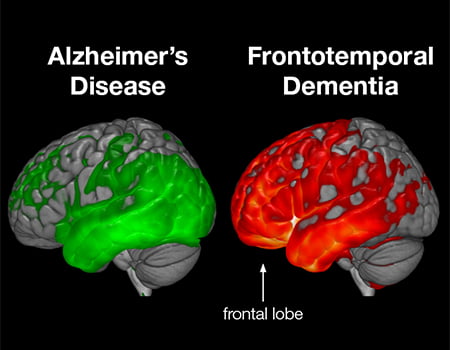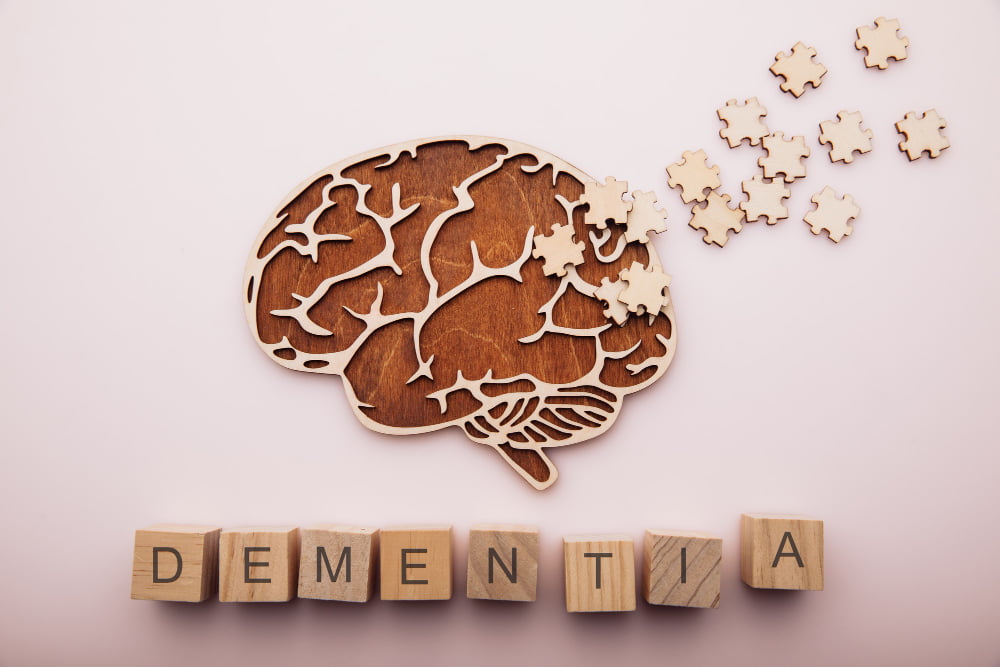Does forgetting your grocery list or occasionally misplacing your keys ring a bell? These everyday lapses are common. But what if forgetfulness becomes more frequent and starts to disrupt your daily life? Dementia can be a cause for concern, and this guide helps you understand the different types, their signs, and how diet can potentially support brain health.
Exploring Alzheimer’s Disease
Alzheimer’s disease is the most common form of dementia, gradually robbing individuals of their cognitive abilities. It affects memory, thinking, and behaviour, making everyday tasks increasingly difficult. Early signs might include forgetting recent events, struggling to find words, or experiencing difficulty with familiar routines. As the disease progresses, memory loss becomes more severe, and confusion sets in.

Unravelling Frontotemporal Dementia (FTD)
Frontotemporal dementia (FTD) is a less common type that primarily affects the frontal and temporal lobes of the brain, regions responsible for personality, decision-making, and language. Unlike Alzheimer’s, memory loss might not be the most prominent symptom. Instead, individuals with FTD may exhibit significant personality changes, such as becoming socially withdrawn or displaying impulsive behaviours. Language difficulties can also manifest, with challenges in speaking or understanding speech.
Understanding Vascular Dementia
Vascular dementia arises due to impaired blood flow to the brain, often caused by strokes or mini-strokes. Symptoms can vary depending on the affected brain regions. Some individuals might experience problems with memory, thinking, and reasoning, similar to Alzheimer’s. Others might struggle with planning, organising, or controlling their movements.
Differentiating the types of Dementia
While there’s some overlap in symptoms, each type of dementia has its unique characteristics. Here’s a quick comparison:
- Alzheimer’s: Gradual memory decline, difficulty with familiar tasks, language problems (later stages).
- FTD: Personality changes, impulsive behavior, social withdrawal, language difficulties (early stages).
- Vascular Dementia: Sudden onset of symptoms, problems with planning, organisation, or movement control, possible memory issues.
Defining Dementia and its subtypes
Dementia is an umbrella term for a group of conditions characterised by a decline in cognitive function that interferes with daily life. It’s not a single disease but a syndrome with various subtypes, including Alzheimer’s, FTD, and vascular dementia.
Signs and symptoms of Dementia
Early detection of dementia is crucial for timely intervention and improved quality of life. Here are some common signs to watch out for:
- Increasing difficulty remembering recent events or conversations.
- Challenges with planning and organising tasks.
- Problems with reasoning and judgement.
- Difficulty with language, such as finding words or following conversations.
- Personality changes, including social withdrawal or unusual behaviours.

Distinguishing Lewy Body Dementia
Lewy body dementia is another type with unique features. Individuals might experience hallucinations (seeing or hearing things that aren’t there), fluctuations in alertness (switching between confusion and normal states), and problems with movement or coordination. These symptoms can sometimes overlap with Alzheimer’s disease, making the diagnosis more complex.
Exploring dietary factors in Dementia management
Diet plays a crucial role in overall health, including brain function. While no single food can reverse dementia, a balanced diet rich in antioxidants, omega-3 fatty acids, vitamins, and minerals can contribute to cognitive health.
This section addresses some common questions regarding diet and dementia:
- Sugar Cravings: Individuals with dementia might crave sweets due to changes in taste perception or difficulty recognizing hunger cues.
- Chocolate Consumption: In moderation, dark chocolate with a high cocoa content may offer some benefits due to its antioxidant properties. However, sugary chocolates can contribute to weight gain and other health problems.
- Sugar and Reversal: Eliminating sugar entirely won’t reverse dementia, but maintaining a balanced diet with limited sugar intake can be beneficial for overall health.
Cognitive screening with the peanut butter test
The “peanut butter test” isn’t a formal diagnosis but a potential screening tool for Alzheimer’s disease. It assesses a person’s ability to follow instructions and complete a simple task, like using a spoon or spreading peanut butter on toast. While helpful for initial evaluation, a doctor’s diagnosis is necessary for confirmation.
Dietary preferences and Dementia patients
- Why do they crave sweets like ice cream? The coldness, creamy texture, and sweet scent of ice cream create a multi-sensory experience for dementia patients. This stimulation can be especially helpful for those with dulled senses, potentially boosting appetite and digestion as well.
- Do they feel constantly hungry? Difficulty recognizing hunger cues or changes in metabolism can lead to increased appetite in some dementia patients.
pen_spark
Changes in appetite and eating habits are common in dementia patients. Some might crave sweets due to altered taste perception or difficulty recognizing hunger cues. Others might eat more or less than usual due to confusion or changes in activity level. It’s crucial to work with caregivers and healthcare professionals to ensure proper nutrition and manage these changes.
Promoting brain health through nutrition
There’s no single “superfood” for dementia, but a balanced diet rich in certain nutrients can support cognitive function. Here are some brain-boosting choices:
- Fatty Fish: Packed with omega-3 fatty acids, which may help memory and learning.
- Berries: Rich in antioxidants that can protect brain cells from damage.
- Leafy Green Vegetables: Provide essential vitamins and minerals vital for brain health.
- Nuts and Seeds: Excellent sources of healthy fats, vitamin E, and other brain-protective nutrients.
Identifying eating habits affecting memory: What to avoid
While a balanced diet promotes brain health, certain eating habits might be detrimental:
- Excessive Saturated and Trans Fats: Found in fried foods and processed meats, these fats can contribute to cognitive decline.
- Refined Carbohydrates: Sugary drinks, white bread, and pastries can cause blood sugar spikes and impair memory.
- Lack of Hydration: Dehydration can affect brain function, so staying well-hydrated is crucial.
Investigating the link between sugar and dementia
Mounting evidence suggests a connection between high sugar consumption and an increased risk of Alzheimer’s disease. This link extends to high blood sugar levels associated with diabetes. It’s important to note that while sugar may be a risk factor, small amounts might occasionally be helpful for some individuals with Alzheimer’s disease. Working with a healthcare professional can help create a personalised dietary plan that addresses both cognitive health and individual needs.
Assessing the impact of specific foods on Brain Health
Here’s a quick breakdown of some commonly questioned foods:
- White Rice: White rice has a high glycemic index, meaning it can cause blood sugar spikes. Opt for brown rice or quinoa instead.
- Tuna: Tuna is a good source of omega-3 fatty acids, which are beneficial for brain health. However, limit mercury intake by choosing smaller varieties and practicing moderation.
- Bacon: High in saturated fat and sodium, bacon can contribute to heart problems, which indirectly affect brain health. Enjoy it occasionally as part of a balanced diet.
- Fruits: Most fruits are excellent sources of vitamins and antioxidants. Berries, in particular, are rich in brain-protective compounds.
Remember, a healthy diet is just one piece of the puzzle. Maintaining an active lifestyle, engaging in mentally stimulating activities, and managing chronic health conditions are all crucial for promoting brain health and potentially reducing the risk of dementia.
Frequently Asked Questions
Vascular dementia: This results from damage to blood vessels in the brain, impacting blood flow and causing cognitive decline. Symptoms can develop rapidly and fluctuate based on the severity.
Frontotemporal dementia: This affects the frontal and temporal lobes of the brain, leading to changes in personality, behaviour, and language. Symptoms can vary but may include personality changes, difficulty with language, and problems with planning and organisation.
Lewy body dementia: This involves abnormal protein deposits in the brain that disrupt brain chemicals. Symptoms can include memory problems, movement difficulties, hallucinations, and fluctuations in alertness.
Mixed dementia: This is a combination of two or more types of dementia, most commonly Alzheimer’s and vascular dementia.
Frontotemporal dementia (FTD) is a type of dementia that affects the frontal and temporal lobes of the brain. These lobes are responsible for personality, emotions, language, and decision-making. Unlike Alzheimer’s disease, which often starts with memory problems, FTD typically shows changes in behaviour and personality as the first signs.
Personality changes: Apathy, irritability, loss of social inhibitions, or impulsive behaviour.
Language difficulties: Problems with finding words, speaking fluently, or understanding language.
Problems with planning and organisation: Difficulty with tasks requiring sequencing, organising, or decision-making.
Vascular dementia often has a more sudden onset of symptoms compared to the gradual decline seen in Alzheimer’s. Additionally, vascular dementia can cause step-like declines in cognitive function following strokes or mini-strokes.
Yes, doctors use specific criteria to diagnose different types of dementia based on symptoms, brain scans, and medical history.
Dementia is a general term for a decline in cognitive function that interferes with daily life. There are various forms, each with its own cause and symptoms. Alzheimer’s disease is the most common, but vascular dementia, frontotemporal dementia, Lewy body dementia, and mixed dementia are also significant forms.
While symptoms can vary, common signs across dementia types include:
Memory problems (forgetting recent events, conversations, or people)
Difficulty with thinking and reasoning
Challenges with language (speaking, understanding, and writing)
Problems with planning and performing daily tasks
Confusion and disorientation
Personality and behaviour changes
Both can involve memory problems, but Lewy body dementia often features:
Fluctuations in alertness and cognitive function (“good days” and “bad days”)
Movement difficulties like tremors, rigidity, or shuffling gait
Hallucinations (seeing or hearing things that aren’t there)
People with dementia crave sweets for a few reasons. Their taste buds may change, making sweets more appealing. They might struggle to recognize hunger cues, leading them to crave quick energy from sugar. Additionally, the taste, texture, and temperature of sweets can provide pleasant sensory stimulation for some dementia patients. However, moderation is key.
Moderate consumption of dark chocolate (high in cocoa content) might be beneficial due to its antioxidant properties. However, sugary chocolates or excessive chocolate intake can contribute to weight gain and other health issues.
Unfortunately, there’s no cure for dementia, and eliminating sugar alone wouldn’t reverse symptoms. However, a healthy diet that limits processed sugar and emphasises fruits, vegetables, and whole grains can support overall health and potentially slow cognitive decline.
Q




